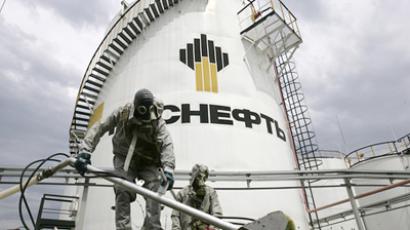The IPO experience

With increasing Russian corporate interest in tapping equity markets and increased interest in Russian IPO’s and SPOs, Business RT spoke with Boris Podolsky, CFO at CTC Media on the key issues for the companies and the interest they can attract.
RT: You listed on the NASDAQ in 2006 in a $346 million IPO. Why did you opt for the Nasdaq? What are the benefits/downsides of listing domestically as opposed to internationally? BP: “CTC Media is a rather unique company for the Russian market – we incorporated in the United States. It’s a Delaware based corporation. So naturally the US listing was the first choice for the listing, because it is a US corporation. Nasdaq, usually in the old days, was a place for listing the technology stocks, CTC Media being in the media segment and allegedly having a relationship to the technology stocks. Also it was recommended by investment banks to list on the Nasdaq at that time.The benefits, obviously of US listing are corporate governance requirements, exposure to the larger investor base, exposure also to the London market, because many of the London based investors acquire stocks of US traded corporations. The downside, there are very strict rules, as you probably know, on listing requirements – disclosure, financial statements, various legal limitations and so forth. So there is upsides and positives and negatives in this story. But all in all it works fine for the company.” RT:When Russian companies go to global investors, how important is it to have an effective roadshow?BP: “Roadshow. I think the most important thing is to have an effective business. The roadshow obviously is secondary, but it is also very important. You have to present the story to the investors, you have to tell about yourselves, you have to have sufficient exposure to investors – to tell about the business, to tell about the market. Management absolutely has to have face to face time with the investor fund managers, because those people usually never invest only on financial numbers. They have to hold hands, look in your eyes, see how you react to the tricky questions. There is a certain level of trust which has to be built for the company to be successfully listed. The charisma of the management, how they are perceived, how efficient they are. So I think a roadshow is a very important part of the listing process.”RT:What does listing imply for an organization in terms of transparency, corporate governance, financial reporting and investor relations? Does this involve a significant culture change for some Russian companies?BP: “I think it depends on where you are listing. If we are talking about a US listing, that probably requires the most changes, of the things you mentioned, including the corporate culture, the transparency, the preparedness of the owners to come out, openly, and talk about ownership structure, which sometimes continues to be an issue in the company, to disclose the ultimate beneficiary of the business, to disclose the in-house sort of stuff, that is usually kept away from the public eye. So that is a huge cultural change for the Russian business in general, regardless of the place of the listing. Now I think it is less of an issue than it was back in the 90s because back then it was a very untransparent business. Now lots of Russian corporations are listed locally, some of the companies are listed in London, some of the companies are listed in Hong Kong, in Europe, so I think it is less of an issue, but it was a big problem before.” RT: What are the key factors in determining the interest in Russian equities? BP: “I think the major factor is the perception of investors on the macroeconomy, the fundamentals for the Russian economy in general, so I think that obviously drives many Russian companies like retail, technology stock telecoms. Those are driven by the Russian fundamental expectations in general. The companies which are resources based, oil obviously, metal, and so forth – they are based on global trends. So depending on the oil prices, the global demand for the metal, China obviously has a huge influence overall trend, the demand, stocks – that determines how one or another business is to the investor. So both local macroeconomy, and the overall situation in the global economy.”RT: You have a large free float. Do you think that helped your IPO? Do you think that international investors may have concerns about a small free float alongside a major single shareholder?BP: “I don’t think there is the right answer, or one answer to this question. I think the minority investors would very much look at who are the partnership investors in Russia. Who are the local holders. Whether it’s a known group of people, or a corporation, or it’s a management, or it’s some unknown hedge fund, or whatever. So I think that very much drives how trustworthy the particular listing is, and how significant the free float should be. In general it is not very good to have a small free float for the company, because that increases the volatility of the stock, and usually volatility is something that shareholders don’t like. So I think, and again it depends on the particular shareholders, but I would say thirty percent, or around this number is a benchmark the average company should be looking at, but then it all depends on a number of factors.”RT: For corporate Russia how important is it that more companies are listed and that Russian equities are more liquid?BP: “I think it is important because that provides a broader view on the industry for the outside industry participants. The transparency on the market, the amount of liquidity on the market, actually creates the market itself. If you have just two corporations listed, people don’t have visibility, there is no market. It is simply not existent. So other factors, for example there is an MSCI indexes, so it is driven by the industry, the particular industry who is listed and put in this particular index. So, for example, there is no technology stock, or there is no media stock like it is for a moment, included in this index, it also limits the investor base, because some of the investors, some of the funds, actually invest based on the index performance. If your stock is not part of the index it never can get acquired by this group of investors, so that is why it is important to have a variety of investors, a variety of companies to be present, because in essence they help themselves, and each other, and create liquidity for the market. It is also in general good for the corporate governance.” RT: What are the risks of large placements in terms of timing? You listed in 2006 (in the run up to the peak of 2007), would you be as confident in current market conditions?BP: “Again I think the answer depends upon the particular business. We had a recent example when Euroset called off the market because they couldn’t get the pricing they wanted to. And we have other examples, where at this very point in time the company roadshow continues with an attempt to place the stock. So I think right now is probably overall a good time, the market is on the rise, there is a huge amount of funds available. We for example ourselves had a number of banks approaching us with particularly interesting financing which, to me, indicates that there is money available. Interest rates in general are at their lowest for a long time, so the resources are out there. I think it is always the case for the particular industry, for the particular business and for the particular story. But I think the overall market conditions are positive at this point.”














